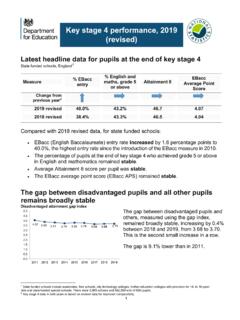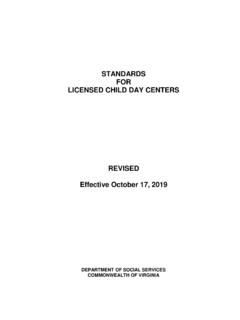Transcription of AUDITING IN THE PUBLIC SECTOR (REVISED AUGUST 2019)
1 Guide ( revised AUGUST 2019 ). Guide for Registered Auditors _____. AUDITING IN THE PUBLIC SECTOR . ( revised AUGUST 2019 ). Independent Regulatory Board for Auditors Auditor-General South Africa Committee for AUDITING Standards PO Box 446. PO Box 8237, Greenstone, 1616 Pretoria 0001. Johannesburg This Guide for Registered Auditors: AUDITING in the PUBLIC SECTOR ( revised AUGUST 2019 ) (this revised Guide) has been developed by the Committee for AUDITING Standards (CFAS), a statutory committee of the Independent Regulatory Board for Auditors (IRBA), jointly with the Auditor-General of South Africa (AGSA). It provides information that will assist registered auditors from audit firms (auditors)1 in understanding the PUBLIC SECTOR environment, within which PUBLIC SECTOR audits are conducted. This revised Guide was approved for issue in AUGUST 2019 and replaces the previous IRBA Guide Guide for Registered Auditors: AUDITING in the PUBLIC SECTOR that has been withdrawn. This revised Guide is approved by the IRBA for joint publication with the AGSA to help improve the understanding and enhance the performance of quality PUBLIC SECTOR audits by registered auditors in PUBLIC practice (registered with the IRBA), who are contracted by the AGSA or appointed as auditors of PUBLIC institutions where the AGSA has opted not to perform the audit, in accordance with Section 4(3) and 4(3A) of the PUBLIC Audit Act, 2004 (Act No.)
2 25. of 2004) (PAA). Section 12(3)(a) of the PAA requires the AGSA to determine the minimum qualifications, experience and competence for authorised auditors . Auditors performing PUBLIC SECTOR engagements shall ensure that they have the professional competence to perform such audit engagements in accordance with the applicable professional standards, additional extensive legal and regulatory requirements as well as the unique circumstances of the PUBLIC SECTOR . The guidance herein is intended to assist auditors to meet these requirements. The information included in this revised Guide, with regard to the audit of financial statements, only refers to reasonable assurance engagements performed in accordance with the International Standards on AUDITING and excludes other types of engagements which may be performed in accordance with Section 20(2)(a) of the PAA. As this is only a guide, auditors should refer to the legislation, which is the primary source of information in order to obtain a comprehensive understanding regarding the requirements for PUBLIC SECTOR audits.
3 This Guide for Registered Auditors: AUDITING in the PUBLIC SECTOR ( revised AUGUST 2019 ) may be downloaded free of charge in both Word and PDF formats from the IRBA website. Copyright AUGUST 2019 by the Independent Regulatory Board for Auditors (IRBA). All rights reserved. Permission is granted to make copies of this work, provided that such copies, in whichever format, are for the purpose of registered auditors discharging their professional duties; for use in academic classrooms or for personal use; are not sold for income; and that each copy bears the following credit line: Copyright AUGUST 2019 by the Independent Regulatory Board for Auditors. All rights reserved. Used with permission of the IRBA.. Otherwise, written permission from the IRBA is required to reproduce, store or transmit this document except as permitted by law. 1 The term auditor is generally used in this revised Guide when referring to registered auditors from audit firms. In certain instances, reference is made to an audit firm , where appropriate.
4 Page 2 of 40. GUIDE FOR REGISTERED AUDITORS: AUDITING IN THE PUBLIC SECTOR ( revised AUGUST 2019 ). GUIDE FOR REGISTERED AUDITORS: AUDITING IN THE PUBLIC SECTOR ( revised AUGUST 2019 ). FOREWORD .. 4. 1. AUDITING IN THE PUBLIC SECTOR IN SOUTH AFRICA .. 6. Introduction ..6. 2. SCOPE OF AUDITING IN THE PUBLIC SECTOR IN SOUTH AFRICA ..7. Mandate of the AGSA ..7. PUBLIC Audit Act ..8. 3. CONDUCTING AUDITS IN THE PUBLIC SECTOR ..10. Quality The Directive, regulations and powers of the AGSA ..10. Annual audits ..11. Material irregularities ..13. National and provincial consolidation ..13. Specific focus areas ..13. Performance audits ..13. Understanding the difference between the audit of reported performance information and performance AUDITING ..14. Identification of internal control deficiencies ..14. Stakeholder engagements ..15. General report and other Legislated dates ..15. 4. AUDITS NOT PERFORMED BY THE AGSA .. 16. 5. LEGISLATION, GUIDANCE, CIRCULARS AND REPORTING FRAMEWORKS.
5 APPLICABLE IN THE PUBLIC SECTOR .. 17. Common applicable legislation ..17. Guidance and circulars issued by the NT ..21. 6. FINANCIAL REPORTING FRAMEWORKS APPLICABLE IN THE PUBLIC 21. 7. KEY STAKEHOLDERS AND ROLE PLAYERS IN THE PUBLIC SECTOR .. 21. National government ..24. Provincial government ..28. Local (municipal) government ..33. Intergovernmental relations and cooperative governance ..35. 8. AUDITORS' INTERACTIONS WITH GOVERNMENT AND GOVERNMENT OVERSIGHT. MECHANISMS .. 36. Interactions between the AGSA and national Parliament, provincial legislatures or council ..36. 9. CONCLUSION .. 38. ABBREVIATIONS AND TERMS .. 39. Page 3 of 40. GUIDE FOR REGISTERED AUDITORS: AUDITING IN THE PUBLIC SECTOR ( revised AUGUST 2019 ). FOREWORD. 1. In general, PUBLIC SECTOR AUDITING can be described as a systematic process of objectively obtaining and evaluating evidence to determine whether information or actual conditions conform to established criteria. PUBLIC SECTOR AUDITING is essential in that it provides legislative and oversight bodies, those charged with governance and the general PUBLIC with information as well as independent and objective assessments concerning the stewardship and performance of government policies, programmes or operations2.
6 2. The mandate of the AGSA3 to audit PUBLIC SECTOR institutions, is derived from the Constitution of the Republic of South Africa (Constitution). In addition, the PUBLIC Audit Act (PAA) prescribes the functions of the AGSA. The scope of the annual audit in the PUBLIC SECTOR includes the audit of the financial statements, reported performance information and compliance with key legislation. Furthermore, the AGSA may perform discretionary engagements such as performance audits, investigations and special audits. 3. The International Organisation of Supreme Audit Institutions (INTOSAI)4 operates as an umbrella organisation for the external government audit community. It provides an institutionalised framework for supreme audit institutions (SAIs) to promote development, transfer knowledge and improve government AUDITING worldwide. The AGSA is a member of INTOSAI and is South Africa's SAI. 4. Key stakeholders in the PUBLIC SECTOR include Parliament, provincial legislatures and their respective committees, national and provincial treasuries, executive authorities, municipal councils, accounting officers and the PUBLIC at large.
7 When AUDITING in the PUBLIC SECTOR , it is important to have an understanding of the three different spheres of government, national, provincial and local, and how they interact with one another. 5. PUBLIC SECTOR institutions operate within a complex legislative framework. Therefore, it is important for PUBLIC SECTOR auditors to understand the legislation applicable to the institutions they audit. 6. The term auditor is generally used in this revised Guide when referring to registered auditors from firms. In certain instances, reference is made to a firm , where appropriate. 7. Audits are generally undertaken in various legislative cycles, for example, national and provincial governments are subject to the PUBLIC Finance Management Act, 1999 (Act of 1999) (PFMA), while local government is subject to the Local Government: Municipal Finance Management Act, 2003 (Act of 2003) (MFMA). In order to conduct these audits within the prescribed timeframes, the AGSA works in conjunction with auditors to help achieve its mandate.
8 2 Definition of PUBLIC SECTOR AUDITING as per International Standards on Supreme Audit Institutions (ISSAI) 100, paragraph 18. ISSAIs can be located at 3 4 Page 4 of 40. GUIDE FOR REGISTERED AUDITORS: AUDITING IN THE PUBLIC SECTOR ( revised AUGUST 2019 ). 8. This revised Guide is complemented by further guidance that explains the various ways in which firms may be involved in the audits of PUBLIC SECTOR institutions. This additional guidance also addresses the process for consulting the AGSA on technical matters. The additional guidance is outlined below: Engagements where audits are performed on behalf of the AGSA. These are dealt with in the Guide for Registered Auditors: Guidance on performing audits on behalf of the AGSA5. Engagements where the AGSA has opted not to perform the audit of a PUBLIC SECTOR institution. The relationship with registered auditors is dealt with in the Guide for Registered Auditors: Guidance on performing audits where the AGSA has opted not to perform the audit6.
9 Engagements where auditors are contracted in by, or seconded to, the AGSA from firms. This relationship with the auditors is managed by the responsible AGSA. engagement manager from whom additional guidance can be sourced. 9. The role of the IRBA regarding all auditors including those who perform PUBLIC SECTOR engagements, is to: Develop and maintain AUDITING and ethics standards which are internationally comparable;. Monitor compliance with professional standards;. Monitor compliance with reportable irregularities and anti-money laundering; and Investigate and take appropriate action against auditors in respect of improper conduct. 5 and 6 and Page 5 of 40. GUIDE FOR REGISTERED AUDITORS: AUDITING IN THE PUBLIC SECTOR ( revised AUGUST 2019 ). 1. AUDITING IN THE PUBLIC SECTOR IN SOUTH AFRICA. Introduction This revised Guide provides information that will assist auditors in understanding the PUBLIC SECTOR environment within which PUBLIC SECTOR audits are conducted. Auditors performing PUBLIC SECTOR engagements should ensure that they have the appropriate knowledge to perform the audit in accordance with the applicable professional standards as well as legal and regulatory requirements, taking cognisance of the unique demands of the PUBLIC SECTOR .
10 SAIs are generally established by the supreme law-making body of the country or by constitutional provision. Commonly, the establishing law or regulation sets out the form of the SAI, the terms and conditions of incumbency, tenure, powers, duties, functions, general responsibilities as well as other matters governing the holding of office and the discharge of the functions and duties to be performed. Whatever the arrangements, the essential function of the SAI is to uphold and promote PUBLIC accountability. The International Standards on Supreme Audit Institutions (ISSAIs) are the international standards on PUBLIC SECTOR AUDITING . The AGSA is South Africa's SAI and was established by the Constitution. The AGSA adopted ISSAI 127 principles that are constructed around the fundamental expectation of SAIs making a difference to the lives of citizens. The extent to which a SAI is able to make a difference to the lives of citizens depends on the SAI; but the overall objectives are: Strengthening the accountability, transparency and integrity of government and PUBLIC SECTOR institutions.




